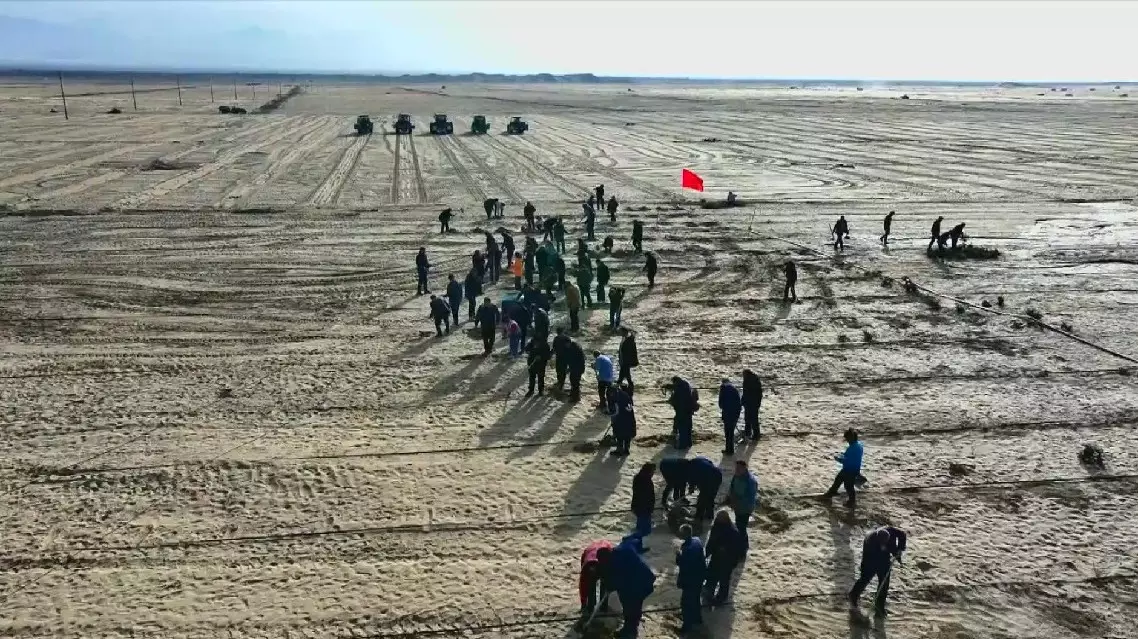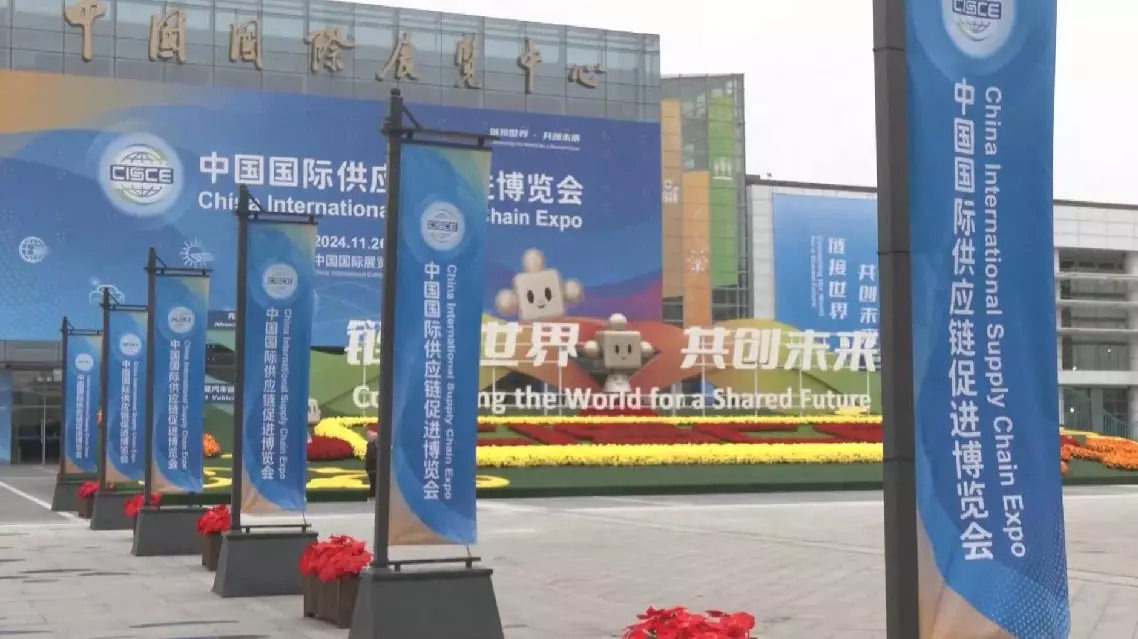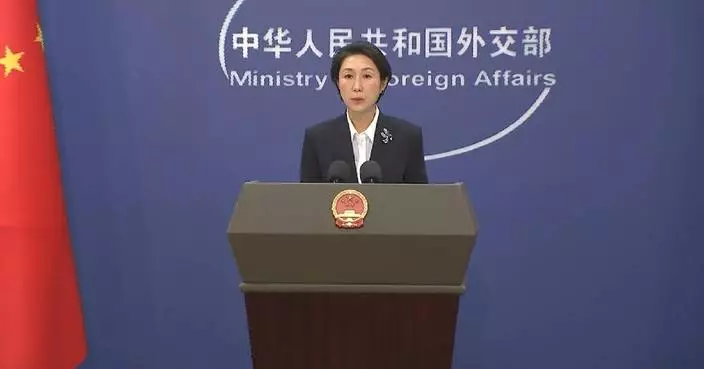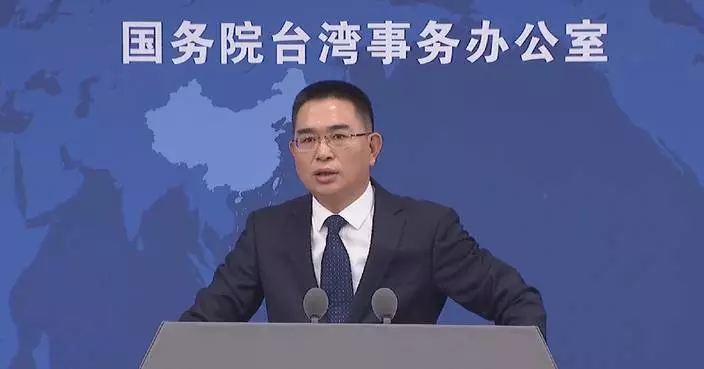China has entered the home stretch in completing a 3,046-kilometer long green barrier circling the Taklimakan Dessert to combat desertification by cultivating drought-resistant plants.
Covering a staggering expanse of 337,000 square kilometers, an area slightly smaller than the size of Germany, Taklimakan in northwest China's Xinjiang Uygur Autonomous Region is China's largest desert and is dubbed as the "Sea of Death".
Through innovative methods such as grass grids, photovoltaic power stations and windbreak forests, China has built a 2,761-kilometer long green barrier on the edge of the Taklimakan Desert by the end of 2023.
Now the building of green barrier enters final stage as the last one kilometer of barrier is scheduled to be finished in Yutian County of China's Xinjiang Uygur Autonomous Region on Thursday.
In Yutian County, residents are cultivating sand-fixation plants including saxaul trees (haloxylon ammodendron), Chinese tamarisk (tamarix chinensis), spine date (ziziphi spinosae), Russian olive (elaeagnus angustifolia L) and roses.
These plants hold economic value, with some being edible or used for medical purposes. The plants being planted are all cultivated in nurseries, and have been proved to be salt-tolerant, drought-resistant, and high survival rate, bringing significant economic benefits to local residents.
Notably, plants are more likely to survive in autumn and winter in this region as the sandstorms weaken. Therefore, people there often take advantage of these favorable conditions to begin planting.
To improve planting efficiency, special machines are used to flatten the sand instead of manually plowing the land. It can level the sand and then plant the saplings one by one from the machine with the help of people, before finally covering the plants with soil and compacting it. The machine takes less than 10 seconds to plant a tree and can cover 100 mu of land in one day, compared to only 2 mu per day by manual labor.
The machines are also equipped with drip-irrigation tapes that supply water to the plants. These tapes are planted along with the plants. At night, the water from the drip tapes freezes, providing a layer of insulation to help keep the plants warm. When spring arrives, the ice thaws and provides water to help the plants sprout. Additionally, the ice can control insects by reducing their activity or number, which in turn improves the plants' survival rate.

China nears completing green barrier circling Taklimakan Dessert
China has emerged as a critical player in boosting the development and security of global supply chains and remains crucial partner to international firms, according to industry experts attending the second China International Supply Chain Expo (CISCE), which is running from Tuesday to Saturday.
The CISCE, as the world's first national exhibition on supply chains, serves as a platform for companies to exchange opinions and achieve long-term cooperation. Themed "Connecting the World for a Shared Future," the expo, hosted by the China Council for the Promotion of International Trade (CCPIT), sees the participation of more than 600 companies, up about 20 percent from last year, according to organizers.
The number of foreign exhibitors has also increased for this year's edition, with U.S. companies expected to contribute the largest share of overseas participation, while more businesses from Europe and Japan are taking part. The world's top 500 companies and industry leaders account for more than 60 percent of the total participants, highlighting the broad appeal and influence of the expo.
Jens Eskelund, president of the European Union Chamber of Commerce in China and the chief North Asia representative of Danish shipping group A.P. Moller-Maersk, underscored China's rapid development over the past two decades and its pivotal role in promoting the international dispersion of value chain activities.
In an interview with the China Global Television Network (CGTN), Eskelund pointed to the country's entry into the World Trade Organization (WTO) 24 years ago as being a key turning point.
"China has been on a fantastic ride, in particular since China joined WTO in 2001. And today China accounts for about one-third of all containers exported in the whole world. And it was coming from a very, very low base. So I don't think that you're going to see anywhere a trajectory as deep and as significant as the one that you saw here. The world was not globalized, but China joined, and China sort of managed to fill that vacuum. And I think China has managed to create an infrastructure, in time, that has actually been able to handle pretty well this significant increase in the amount of cargo that needs to get handled," he said.
He also hailed the country's high-tech developments and said it is leading the smart transformation of the global supply chain.
"Now again we see China taking the lead on sort of the next steps in terms of automation, in terms of AI, and in terms of creating visibility and a lot of exciting developments in supply chain management here in China," he said.
Tetsuro Homma, the executive vice president of leading Japanese electronic product manufacturer Panasonic Holdings, said the firm has developed closer business relations with its Chinese partners over the past three decades and stressed that the tech giant is hoping international trade remains open and barrier-free.
"Around thirty years ago, Panasonic's Chinese business accounted for no more than two percent of its global business, but now it is 23 percent. We purchased raw materials, parts, machines, and even automated production equipment from 6,000 suppliers in China. Therefore, we strongly hope that the global economic system will maintain a free, fair and just trade system," he told the China Media Group (CMG).
Meanwhile, Jiang Yekui, the chief sustainability officer of Syngenta Group China, a company focused on agrichemicals and seeds, said the Swiss-headquartered group hopes to expand cooperation through its participation in the supply chain expo as part of wider efforts to address challenges facing the global agricultural sector.
"It (the supply chain expo) particularly emphasizes the concept of 'chain'. In fact, everyone knows that there are many links in the field of agriculture, and it is difficult for enterprises to solve all problems by themselves. So we are particularly looking forward to more cooperation with our partners at the chain expo to help solve global agricultural problems. Relying on our advantages of operating and providing leading agricultural solutions in more than 100 countries, we seek to connect the world's high-quality agricultural products with the needs of the vast Chinese market," he said.

Int'l business leaders hail China's role in securing global supply chains










